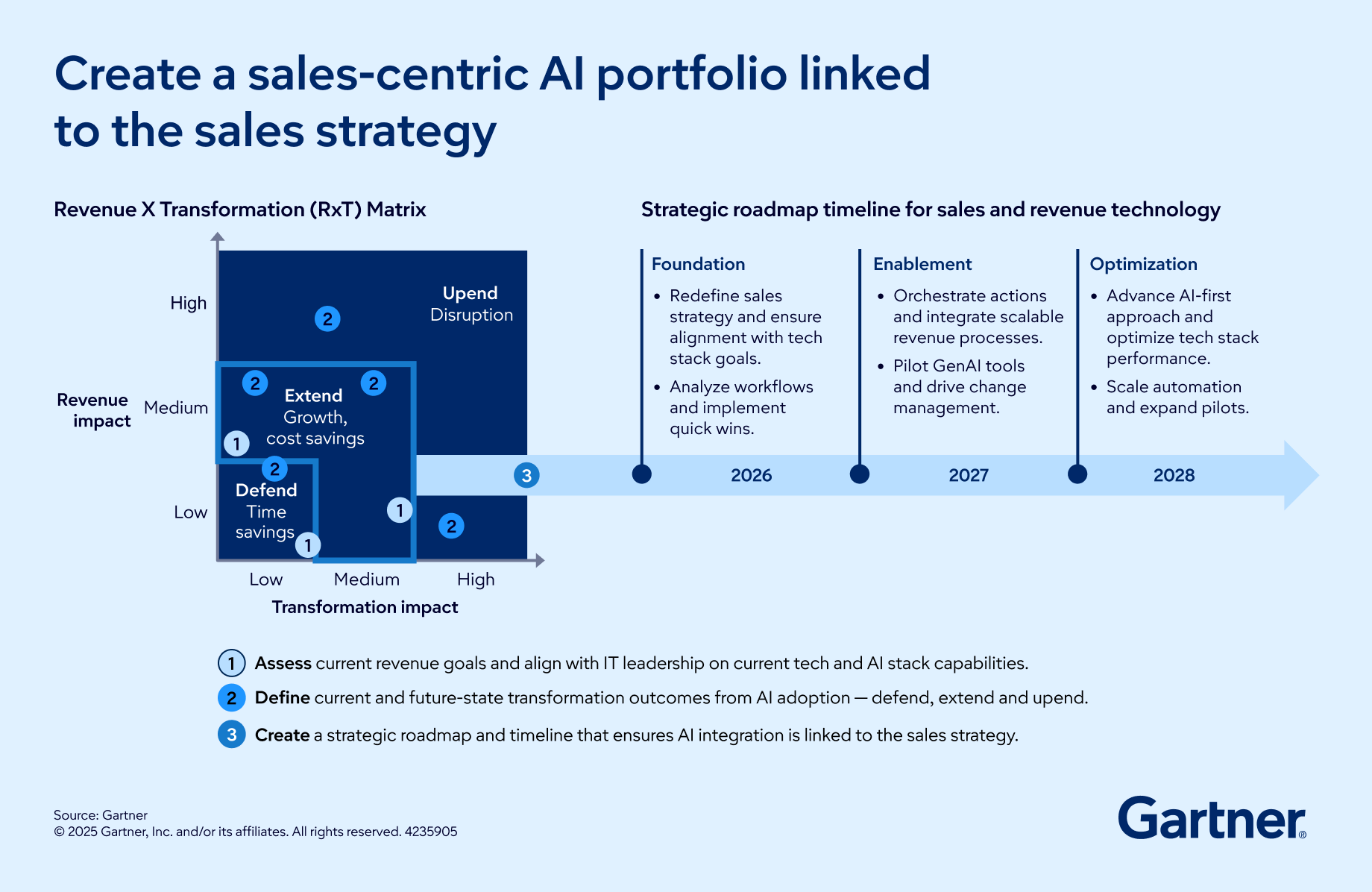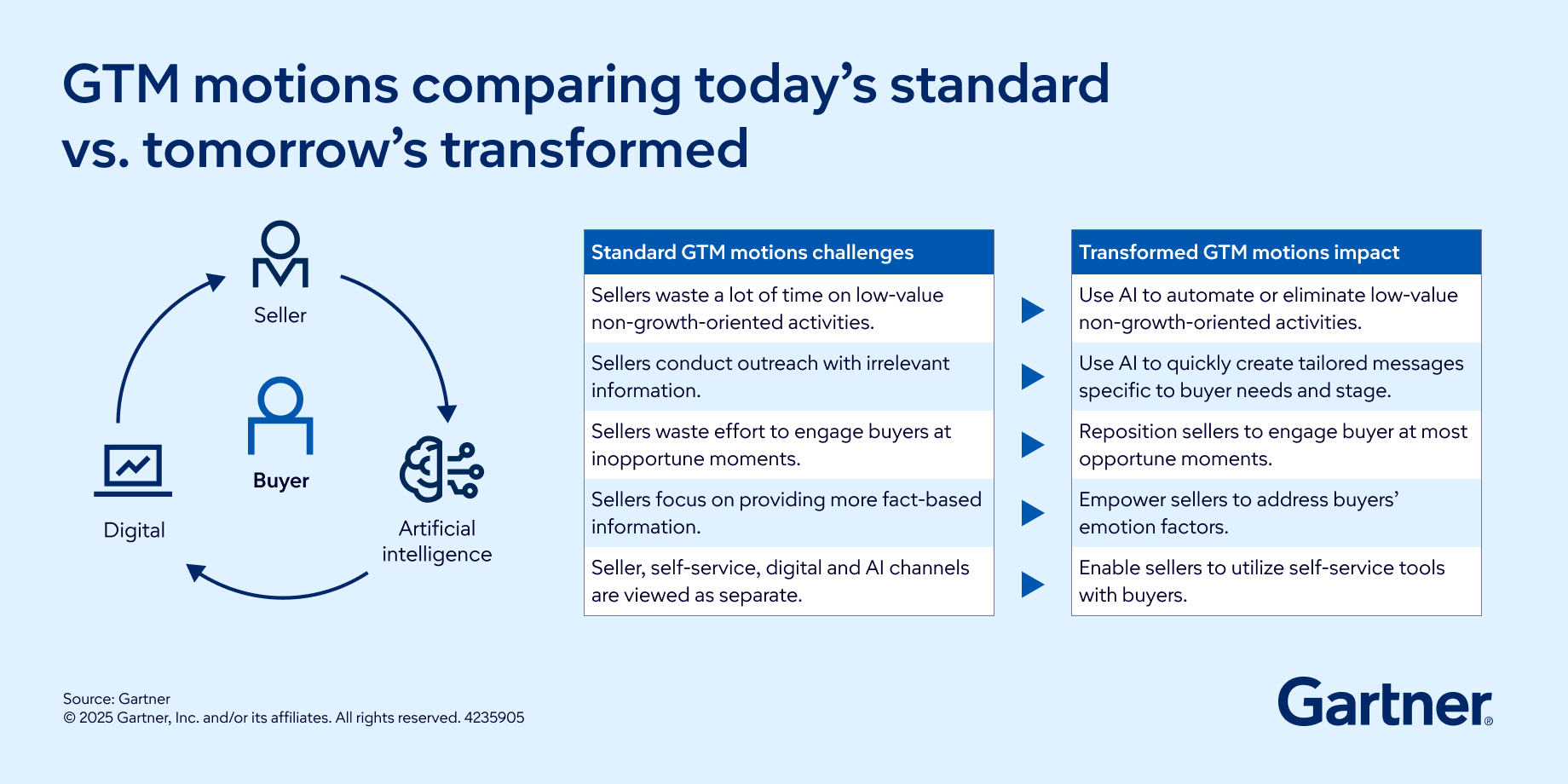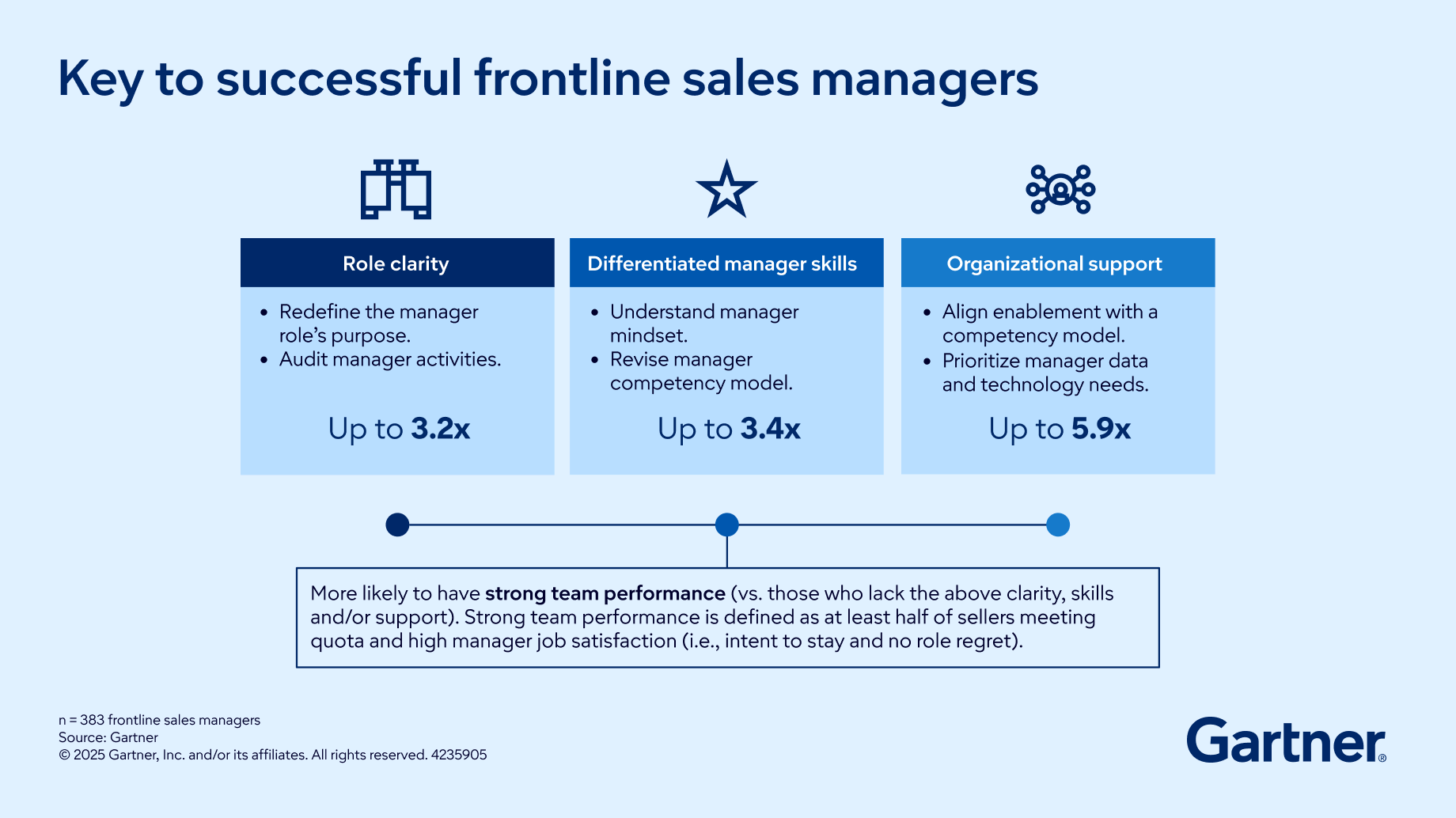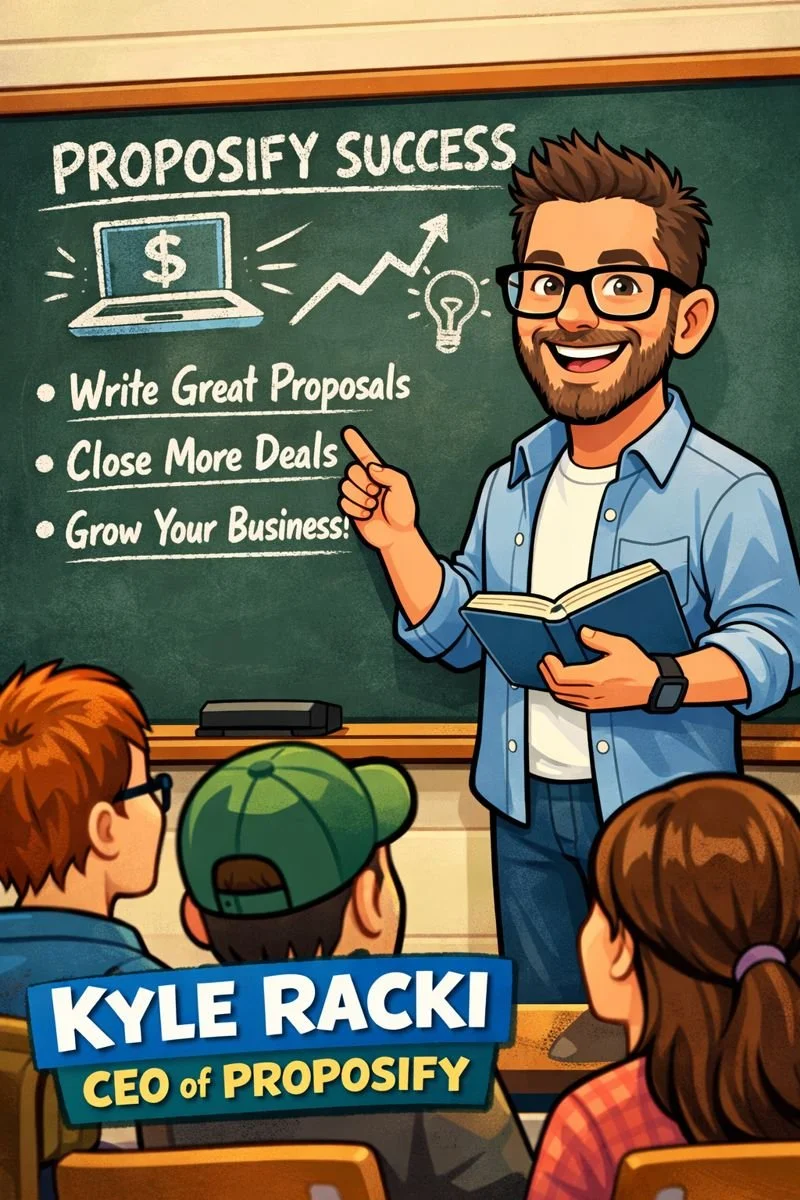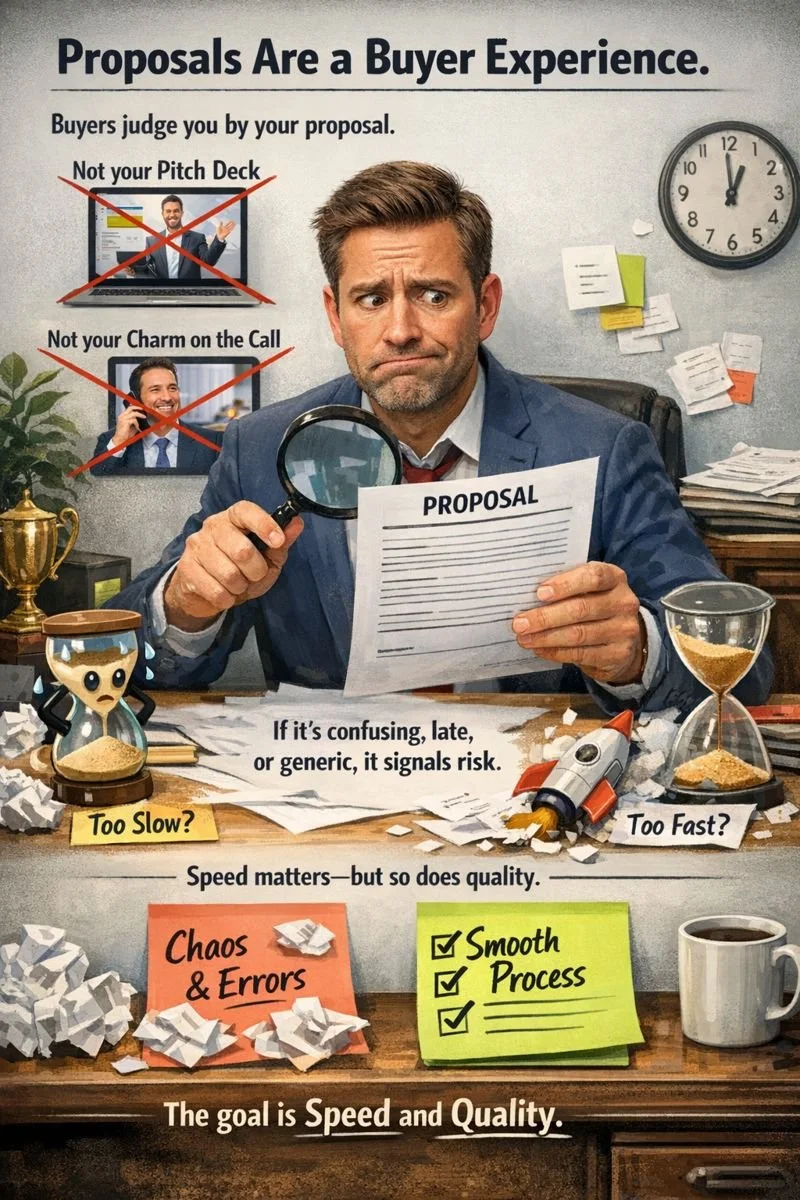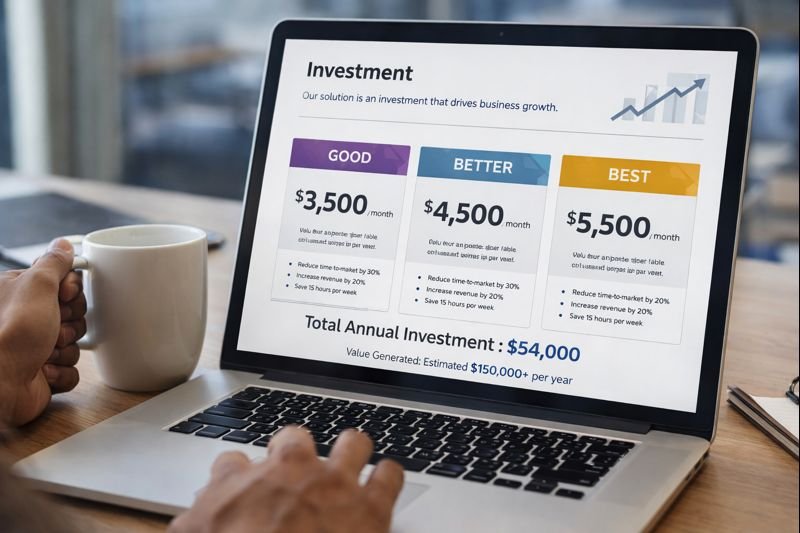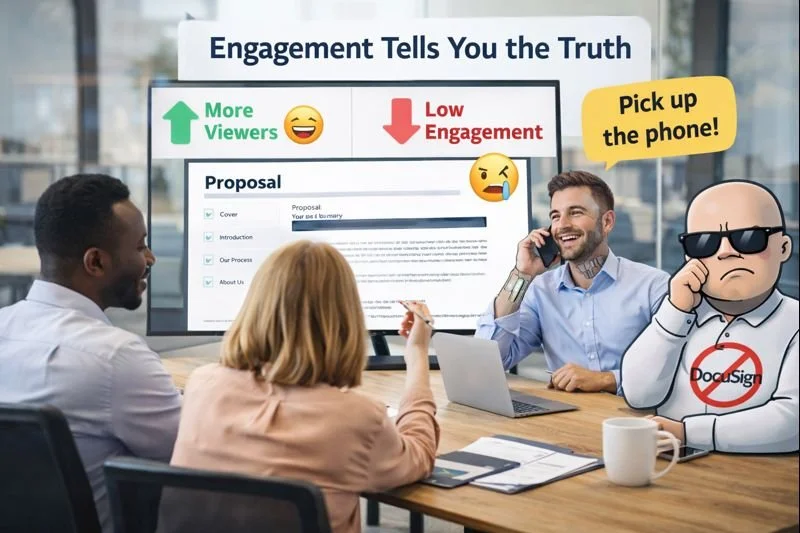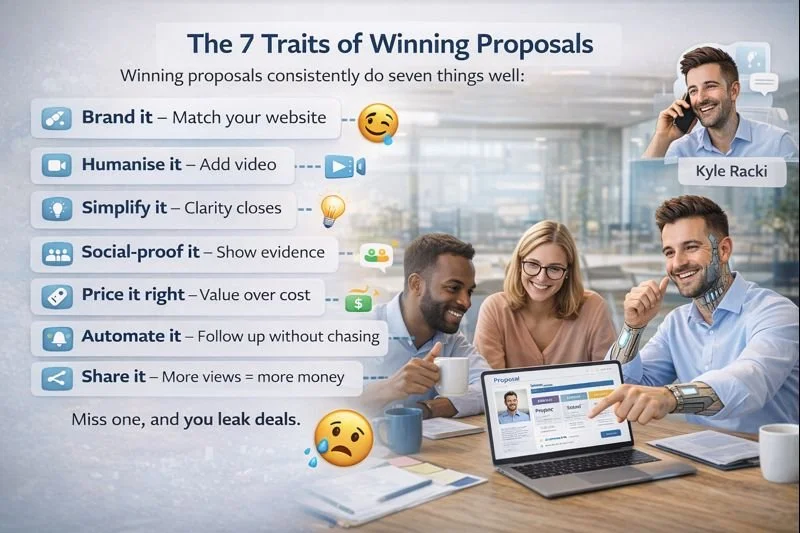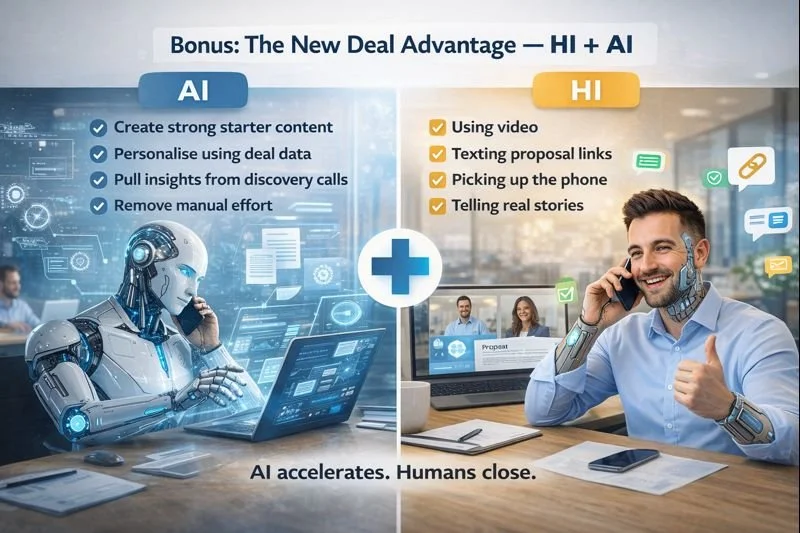
BLOG
Gartner’s Top 3 Strategic Priorities for Sales Enablement Leaders
Sales enablement is at a crossroads. For years, it’s been about content. Decks. Playbooks. Training sessions.
That’s no longer enough: Enablement must now become a performance engine — one that shapes seller behaviour, scales execution, and proves impact. Especially as AI reshapes how sales teams work.
Sales enablement is at a crossroads. For years, it’s been about content. Decks. Playbooks. Training sessions.
That’s no longer enough.
Here are the three priorities that matter most for founders and executives heading into 2026.
Priority 1: Maximise ROI from AI (or It Becomes Noise)
Most leaders believe AI should unlock productivity. Few can show where it actually does. The problem isn’t tools. It’s direction.
Enablement teams often lack a clear charter. Sellers resist change. Initiatives pile up. AI gets bolted on without changing behaviour.
Takeaway: AI only creates value when it changes what sellers do, not just what they have.
That means:
Defining clear seller behaviours tied to strategy
Using AI to spot gaps in performance, not just report activity
Tracking behaviour change as a leading indicator, not lagging revenue
AI should tell you:
Where deals stall
Which behaviours separate top performers
What intervention actually works — and when
If you can’t prove impact, AI is just another shiny tool.
Founder reflection: If you removed revenue results, could you clearly describe the seller behaviours AI is improving today?
Priority 2: Use Technology and Data to Scale What Works
Buyers are changing faster than enablement programs. Static training can’t keep up. Quarterly updates are already obsolete. Gartner argues enablement must move from programs to systems.
That means:
Auditing the full revenue tech stack
Connecting data across CRM, enablement, coaching, and forecasting
Activating predictive signals, not just dashboards
The goal isn’t more data. It’s earlier insight.
AI should:
Flag risk before deals go dark
Surface the right content inside the seller’s workflow
Automate low-value tasks so sellers stay in the field
This is how enablement scales without adding headcount. Not by doing more work. By orchestrating performance in real time.
Founder reflection: Where does your revenue team still rely on static training instead of live, data-driven signals?
Priority 3: Redesign Talent for an AI-First World
Here’s the uncomfortable truth. Many enablement skills were built for a pre-AI era. Content creation. Manual training design. One-size-fits-all programs.
AI now does much of this faster and better. Gartner’s view is clear: enablement teams must upskill or become irrelevant.
The future skill set looks different:
Data literacy
AI fluency across the sales tech stack
Performance orchestration, not content production
Enablement’s role shifts from creating information to guiding decisions.
AI enables:
Hyper-personalised learning
Scenario-based reinforcement
Real-time feedback inside deals
When done well, AI Enablement of your team reduces noise and focuses sellers on what matters now.
Founder reflection: If AI removed manual training and content creation tomorrow, would your enablement team still know how to drive performance?
Final Thought
Sales enablement is no longer a support function. It’s a strategic lever. Founders who treat it that way will move faster, adapt quicker, and scale smarter. Those who don’t will keep wondering why their tools aren’t paying off.
Source: Sales Enablement Leadership Vision 2026 | Gartner
Gartner 2026 Vision for Sales and AI
Gartner’s 2026 vision is clear: sales leaders face rising pressure, shrinking buyer attention, and explosive AI hype.
Yet, while over 60% of sales teams now use GenAI, only one in three see real productivity gains.
Gartner outlines three strategic priorities that will define winning sales teams over the next two years.
Based on “Leadership Vision for 2026: Chief Sales Officer” by Gartner Leadership Vision for 2026.
In 2026, the best sales leaders will quietly build systems where:
AI does the heavy lifting,
Sellers show up at the right moment, and
Managers turn potential into performance.
The following three strategic priorities will define winning sales teams over the next two years:
1. Build a Sales-Centric AI Portfolio
Not all AI is equal.
Leaders must choose where AI protects today’s revenue, where it extends capability, and where it fundamentally changes how selling works.
The author recommends a staged roadmap:
Foundation (2026): Orchestrate workflows and integrate AI into daily selling.
Enablement (2027): Use AI to change how sellers engage buyers.
Optimisation (2028): Embed AI across the full revenue engine.
AI must become a productivity partner, not a novelty tool.
2. Redesign Go-To-Market Around the Buyer
Buyers don’t want more sellers. They want better timing and better insight.
This shift matters because Gartner’s data shows winning suppliers outperform on buyer emotion:
87–88% make customers feel valued, heard, inspired and trusted.
Today:
Sellers act too late.
Outreach feels generic.
Digital, AI and human channels operate in silos.
Tomorrow:
Data signals trigger engagement.
AI helps create tailored messages.
Reps appear at the exact moment buyers need guidance.
Digital and human channels work as one.
3. Turn Sales Managers Into Force Multipliers
Great sellers win deals.
Great managers build machines that win every quarter.
The final infographic shows three levers that radically lift team performance:
Role Clarity Up to 3.2x stronger
Differentiated Manager Skills up to 3.4x
Organisational Support up to 5.9x
The author proposes the following practical next steps:
Redefine what “good” looks like.
Hire for coaching mindsets, not tenure.
Equip managers with AI, systems and real authority.
Final three questions
The real question for a sales leader in 2026 is:
Where should AI genuinely make my team better?
Where in the buyer’s journey do we add the most value?
Who is shaping my sellers every single day?
How to win more deals with better proposals
These lessons come from Kyle Racki, CEO of Proposify, based on insights from over 900,000 proposals analysed on the Proposify platform and shared in a recent YouTube presentation.
Your proposal is not paperwork.
Buyers judge you by your proposal.
Not your pitch deck.
Not your charm on the call.
If it’s confusing, late, or generic, it signals risk.
Speed matters—but so does quality.
Too slow, you lose momentum.
Too fast, you make mistakes.
The goal is speed and quality.
That only comes from process.
.
Build a Proposal Process (Not a Dark Art)
Whatever it is, the way you tell your story online can make all the difference.
Proposals feel like a dark art because they’re not public.
You rarely see how great companies do them.
Kyle uses a simple pizza analogy:
Template = crust, sauce, cheese
Sections + pricing = ingredients
Proposal = finished pizza
The base stays the same.
Only the ingredients change.
When every proposal starts from scratch, quality drops and speed dies.
The Anatomy of a Winning Proposal
Winning proposals are surprisingly consistent. They are simple, familiar and buyer-friendly.
The core structure:
Cover
Introduction
Your Process
About You
Social Proof
Pricing
Next Steps
Use Video to Reach Invisible Decision-Makers
You won’t meet every decision-maker.
V
ideo bridges that gap.
Use short videos to:
Humanise the proposal
Reinforce your brand
Explain your thinking
Build trust when you’re not in the room
An intro video alone can lift engagement—fast.
Social Proof Works (But Timing Matters)
Social proof isn’t about bragging.
It’s about evidence.
But don’t lead with it.
Let buyers first understand:
Their problem
Your approach
Your thinking
Then show proof.
Pricing: Frame It as an Investment
Pricing is the first thing buyers look for.
That’s why it shouldn’t be at the start.
Put pricing in the middle.
Make them earn it!
Key rules:
Price by value, not effort
Reduce choice to reduce fatigue
Use Good / Better / Best options
Add optional add-ons so buyers upsell themselves
This is straight out of 20 years of SaaS playbooks—and it works.
Automate Follow-Up (Without Being Pushy)
Manual follow-up is inconsistent.
Automated follow-up is invisible—and effective.
Automated reminders increase close rates by ~5%:
View reminders
Sign reminders
Expiry reminders
You stay present without chasing.
Engagement Tells You the Truth
One insight matters more than most founders realise:
When a proposal is shared internally, close rates double.
More viewers = real consideration.
Low engagement is a warning sign.
That’s when you pick up the phone.
Proposals should sell—not just collect signatures.
The 7 Traits of Winning Proposals
Winning proposals consistently do seven things well:
Brand it – Match your website
Humanise it – Add video
Simplify it – Clarity closes
Social-proof it – Show evidence
Price it right – Value over cost
Automate it – Follow up without chasing
Share it – More views = more money
Whatever it is, the way you tell your story online can make all the difference.
Bonus: The New Deal Advantage — HI + AI
The future of proposals isn’t AI alone.
It’s HI + AI.
AI helps you:
Create strong starter content
Personalise using deal data
Pull insights from discovery calls
Remove manual effort
Humans still win by:
Using video
Texting proposal links
Picking up the phone
Telling real stories
AI can accelerate the process. But to close is human.
Final Thought
If your proposals feel slow, heavy, or fragile—it’s not your team.
It’s your process.
Fix the process, and deals move faster.
PLG + AI: The New Sales Engine
Product-Led Growth (PLG) has long been the go-to strategy for scaling SaaS businesses. But as AI continues to evolve, a new model is emerging: PLG combined with AI-powered sales representatives.
In this hybrid approach, AI handles routine, low-value sales tasks, allowing human sales teams to focus on complex, high-value interactions. This shift addresses the growing challenge of sourcing top-tier sales talent, as highlighted by Gartner's finding that 61% of sales leaders struggle to build the teams they need.
However, for this model to succeed, products must be designed with AI in mind. They need to be easy to deploy, integrate, and use, as AI can only operate within the parameters set by the product's design.
The integration of AI into the PLG model isn't just a trend—it's a necessity. As Jason Lemkin notes, "More and more founders will optimize around a PLG + AI AE motion."(SaaStr)
Reference: Lemkin, J. (2025, April 30). 2026 Will Be a World of PLG+AI. PLG plus AI Sales Reps. We Have No Choice. SaaStr.
The End of the AI Upsell?
Atlassian has made a bold move: it's no longer charging most customers extra for AI features. Their AI platform, Rovo, is now included at no additional cost for all but the heaviest users.
This shift signals a broader trend in the SaaS industry. As AI becomes integral to software products, the practice of upselling AI as a premium add-on is losing traction. Customers expect AI capabilities as part of the core offering, not as an expensive extra.
The takeaway? AI is transitioning from a novelty to a standard feature. SaaS companies may need to rethink their pricing strategies, focusing on delivering value through AI integration rather than viewing it as a separate revenue stream.
Reference: Lemkin, J. (2025, May 6). Atlassian: “We’re Not Going to Charge More Customers Extra for AI Anymore”. The Beginning of the End of the AI Upsell? SaaStr.
⚡ How to Become an AI-Native Employee
Inside the mindset that’s redefining speed, ownership, and success in the age of AI.
If you want a glimpse of the future of work, you need to pay attention to what Elena Verna just revealed from inside the lightning-fast, AI-fuelled startup Lovable.
In just seven months, this tiny powerhouse of ~35 people has hit an eye-watering $80 million in ARR. And no—it’s not just because of some magical AI product.
It’s because of the people.
AI-native employees.
They’re not just using AI.
They’re thinking, working, and building through it.
And it’s changing everything.
🤔 Wait, What Is an AI-Native Employee?
Elena thought “AI-native” referred to the product. GPT-powered, agent-based workflows. Smart automation. That kind of thing.
But once she stepped inside Lovable, she saw the truth:
"The product being AI-powered is only half the story. The real shift is how people work."
An AI-native employee doesn’t use AI like a tool in the shed.
They live in it. They solve problems with it.
It’s not Plan B. It’s Plan A. Always.
🧠 The AI-Native Mindset: A Shift in Operating System
Traditional tech teams operate like bureaucracies wrapped in Jira tickets. Want to ship a new idea? Prepare for a parade of planning docs, check-in meetings, budget approvals, and cross-functional coordination headaches.
By the time anything launches, it’s barely recognisable—and six months too late.
But inside Lovable, something else is happening.
Elena describes it as default-to-done.
Someone wants to launch a campaign? They build it.
Need an internal tool? They spin it up.
Marketing, dev, ops—all moving at breakneck speed, powered by AI and unshackled by layers of permission.
No waiting. No asking. Just doing.
💡 How You Can Become AI-Native
You don’t need to work at Lovable to adopt this mindset. You just need to embrace a few key behaviours:
1. Default to Action
Don’t ask if it’s possible—try it.
Use AI to sketch ideas, prototype solutions, write code, create content, automate workflows. Whatever the job is—start it with AI.
2. Own It All the Way
At Lovable, if you build it, you own it.
No passing the baton. No hiding behind process.
This is the future: you = maker, manager, and multiplier.
3. Shrink the Cost of Failure
With AI, iteration is free.
Mistakes don’t cost months.
Test. Learn. Adjust. Fast.
The AI-native employee treats failure as part of the feedback loop.
4. Ditch the Legacy Process
Process has its place—but not up front.
Don’t build for alignment. Build for outcomes.
When something starts working, then systematise.
🧬 What Makes This So Powerful?
AI-native work isn’t just efficient—it’s magnetic.
The velocity creates momentum. The ownership builds trust. The speed becomes a cultural advantage.
As Elena points out, these aren’t just tech whizzes. Many are straight out of school. They haven’t been soaked in corporate politics or paralysed by approval workflows.
They see a problem. They fix it.
They use AI as a co-creator—not an assistant.
And when everyone works this way, your company moves as one organism, not a pile of silos.
🧨 But… What About Jobs?
Elena doesn’t sugar-coat it:
Roles that exist solely to manage chaos or coordinate tasks across teams are disappearing.
Ops roles? Shrinking.
Managers with no domain depth? Fading fast.
This isn’t about losing jobs.
It’s about cutting the organisational fat that slows down innovation.
If you have real skills—sales, product, marketing, engineering—your future is bright if you embrace AI.
But if your job is just to “check in,” approve, and schedule? You’re in trouble.
🔥 Why Legacy Companies Will Struggle
Here’s the harsh truth: you can’t bolt AI onto a broken org chart and expect magic.
You can’t form an “AI taskforce” and hope people suddenly start thinking differently.
The AI-native mindset is caught, not taught.
It spreads through culture, trust, and example.
And if someone dares to work differently in a legacy system? Bureaucracy will bleed them dry with 1,000 cuts:
“Did Legal approve this?”
“Let’s revisit in Q4.”
“Run it through governance.”
Spark: extinguished.
🎯 Final Word from the Frontlines
The future of work won’t be defined by who has the best AI tools.
It will be defined by who has the guts to use them without asking permission.
AI-native employees are the new 10x team.
They move fast.
They think independently.
And they don’t wait to be told.
Elena’s insight is clear:
✅ Companies will shrink.
✅ Middle managers will fade.
✅ Process will become lightweight and optional.
✅ AI-native talent will lead the charge.
The good news? You don’t need to work at Lovable to be one of them.
You just need to start thinking like one today.
📝 Based on the original article by Elena Verna, “The Rise of the AI-Native Employee” published on June 28, 2025.
AI Is Already Changing Sales
If you think AI is a future trend, think again. It's already transforming the sales landscape.
According to Jason Lemkin's article, "10 Ways AI Will Change Sales Forever. It’s Already Happening, In Fact," AI is poised to revolutionize B2B sales within the next 12–18 months. One of the most compelling insights from the article is:
“AI will join your sales calls – Within 12–18 months, your AI will be on every call, knowing your product cold and eliminating ‘I’ll get back to you’ moments.”
This means that AI won't just assist with administrative tasks; it will actively participate in sales calls, providing real-time, accurate information, and enhancing the overall customer experience.
Furthermore, AI is expected to handle up to 50% of routine sales, especially for transactional deals under $10K. This shift will allow sales professionals to focus more on complex, high-value interactions that require human intuition and relationship-building skills.
The integration of AI into sales processes is not a distant future—it's happening now. Sales professionals who embrace AI tools will be better equipped to meet increasing customer expectations and stay ahead in a rapidly evolving market.
Reference: Lemkin, J. (2025, April 28). 10 Ways AI Will Change Sales Forever. It’s Already Happening, In Fact. SaaStr.
AI Surprises: From Chatbot to Product Guru
SaaStr's AI assistant, initially designed for basic support, has taken on unexpected roles. In just five weeks, it has conducted over 30,000 conversations with B2B executives, offering insights beyond its original scope.
Notably, the AI has:
Reviewed hundreds of VC pitch decks and board packages
Drafted compensation plans for sales leaders
Rewritten outbound sales scripts
Coached founders through business slowdowns
Evaluated candidates and advised on hiring decisions
Assessed speaker submissions for SaaStr events(SaaStr)
Perhaps most impressively, it has begun making unsolicited product recommendations, such as comparing tools like Clay and Apollo, despite not being programmed for this function.(SaaStr)
This evolution underscores a key insight:
“A great AI can do many things. Perhaps especially, do things you never expected it to do.”
The takeaway for sales professionals? AI's capabilities are expanding rapidly, often in unforeseen ways. Embracing these developments can unlock new efficiencies and insights in the sales process.
Reference: Lemkin, J. (2025, April 24). Our AI is Now Making Product Recommendations. And Many Other Things We Never Expected It Would. SaaStr.
From Zero to Unicorn: The Codeium Playbook
In just under a year, Codeium skyrocketed from a three-person sales team to a $1B+ AI powerhouse. Their secret? A blend of founder-led sales, strategic hiring, and a culture that rewards performance.
Graham Moreno, VP of Worldwide Sales, shared in SaaStr’s CRO Confidential:
“Before hiring their first sales reps, the founders personally closed millions in revenue.”
This hands-on approach laid a solid foundation for scaling. By bringing in proven talent from companies like MongoDB and Snowflake, they ensured a high-performing, culturally aligned team. Their compensation models? So effective that 70% of early hires exceeded annual quotas, with some on track for seven-figure earnings.
Codeium’s AI assistant isn’t just a tool—it’s transformative. Generating 45% of developers’ code, it’s turning weeks of work into hours. And by investing early in RevOps and enablement, they built a scalable, data-driven sales machine.
Reference: Lemkin, J. (2025, March 5). CRO Confidential: How Codeium Built A Billion-Dollar AI Company and a Winning Sales Machine with VP of Worldwide Sales, Graham Moreno. SaaStr.
Smarter Than 90% of Your Team
Here’s a bold claim: AI can’t sell (yet), but it’s already smarter than most of your sales team.
That’s the take from SaaStr’s Jason Lemkin—and it’s not just hype. Today’s AI knows your product better than your average rep, never forgets a detail, and can instantly pull from a knowledge base of millions of data points.
Here’s the line that really stings (or inspires):
“It probably already knows your product better than 90% of your sales team.”
What does that mean for sales leaders? You can’t afford to ignore the gap. The reps who treat AI as a threat will get left behind. The ones who treat it as a coach, assistant, and strategic partner will thrive.
AI might not close the deal today, but it’s setting the table, running the playbook, and prepping every rep to perform better—if they’re willing to lean in.
Want to stay valuable? Make sure you're doing what AI can’t—building trust, adapting on the fly, and influencing decisions. The rest? Let the machines handle it.
Reference: Lemkin, J. (2025, April 15). AI Can’t Sell (Yet) — But It’s Probably Already Smarter Than 90% of Your Sales Team. SaaStr.






